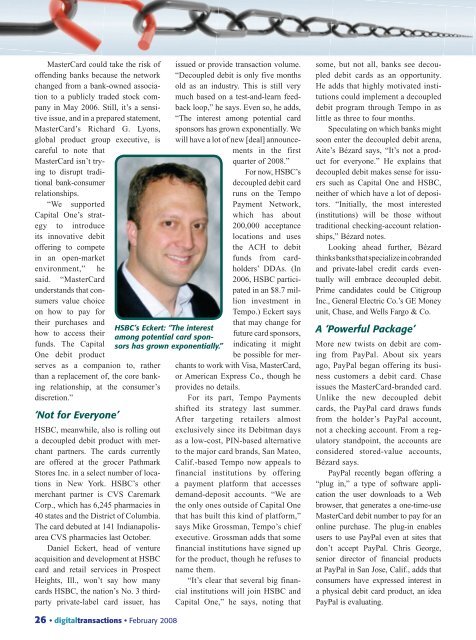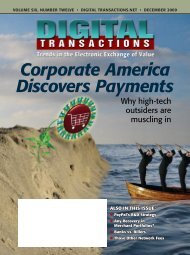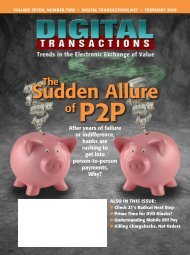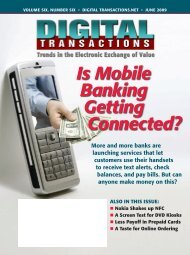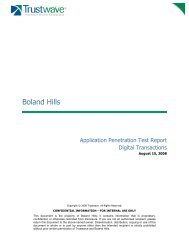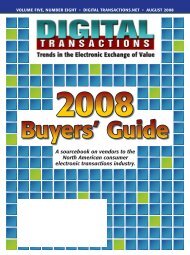The Broken Link - Digital Transactions
The Broken Link - Digital Transactions
The Broken Link - Digital Transactions
You also want an ePaper? Increase the reach of your titles
YUMPU automatically turns print PDFs into web optimized ePapers that Google loves.
MasterCard could take the risk of<br />
offending banks because the network<br />
changed from a bank-owned association<br />
to a publicly traded stock company<br />
in May 2006. Still, it’s a sensitive<br />
issue, and in a prepared statement,<br />
MasterCard’s Richard G. Lyons,<br />
global product group executive, is<br />
careful to note that<br />
MasterCard isn’t trying<br />
to disrupt traditional<br />
bank-consumer<br />
relationships.<br />
“We supported<br />
Capital One’s strategy<br />
to introduce<br />
its innovative debit<br />
offering to compete<br />
in an open-market<br />
environment,” he<br />
said. “MasterCard<br />
understands that consumers<br />
value choice<br />
on how to pay for<br />
their purchases and<br />
how to access their<br />
funds. <strong>The</strong> Capital<br />
One debit product<br />
serves as a companion to, rather<br />
than a replacement of, the core banking<br />
relationship, at the consumer’s<br />
discretion.”<br />
‘Not for Everyone’<br />
HSBC, meanwhile, also is rolling out<br />
a decoupled debit product with merchant<br />
partners. <strong>The</strong> cards currently<br />
are offered at the grocer Pathmark<br />
Stores Inc. in a select number of locations<br />
in New York. HSBC’s other<br />
merchant partner is CVS Caremark<br />
Corp., which has 6,245 pharmacies in<br />
40 states and the District of Columbia.<br />
<strong>The</strong> card debuted at 141 Indianapolisarea<br />
CVS pharmacies last October.<br />
Daniel Eckert, head of venture<br />
acquisition and development at HSBC<br />
card and retail services in Prospect<br />
Heights, Ill., won’t say how many<br />
cards HSBC, the nation’s No. 3 thirdparty<br />
private-label card issuer, has<br />
HSBC’s Eckert: “<strong>The</strong> interest<br />
among potential card sponsors<br />
has grown exponentially.”<br />
issued or provide transaction volume.<br />
“Decoupled debit is only five months<br />
old as an industry. This is still very<br />
much based on a test-and-learn feedback<br />
loop,” he says. Even so, he adds,<br />
“<strong>The</strong> interest among potential card<br />
sponsors has grown exponentially. We<br />
will have a lot of new [deal] announcements<br />
in the first<br />
quarter of 2008.”<br />
For now, HSBC’s<br />
decoupled debit card<br />
runs on the Tempo<br />
Payment Network,<br />
which has about<br />
200,000 acceptance<br />
locations and uses<br />
the ACH to debit<br />
funds from cardholders’<br />
DDAs. (In<br />
2006, HSBC participated<br />
in an $8.7 million<br />
investment in<br />
Tempo.) Eckert says<br />
that may change for<br />
future card sponsors,<br />
indicating it might<br />
be possible for merchants<br />
to work with Visa, MasterCard,<br />
or American Express Co., though he<br />
provides no details.<br />
For its part, Tempo Payments<br />
shifted its strategy last summer.<br />
After targeting retailers almost<br />
exclusively since its Debitman days<br />
as a low-cost, PIN-based alternative<br />
to the major card brands, San Mateo,<br />
Calif.-based Tempo now appeals to<br />
financial institutions by offering<br />
a payment platform that accesses<br />
demand-deposit accounts. “We are<br />
the only ones outside of Capital One<br />
that has built this kind of platform,”<br />
says Mike Grossman, Tempo’s chief<br />
executive. Grossman adds that some<br />
financial institutions have signed up<br />
for the product, though he refuses to<br />
name them.<br />
“It’s clear that several big financial<br />
institutions will join HSBC and<br />
Capital One,” he says, noting that<br />
some, but not all, banks see decoupled<br />
debit cards as an opportunity.<br />
He adds that highly motivated institutions<br />
could implement a decoupled<br />
debit program through Tempo in as<br />
little as three to four months.<br />
Speculating on which banks might<br />
soon enter the decoupled debit arena,<br />
Aite’s Bézard says, “It’s not a product<br />
for everyone.” He explains that<br />
decoupled debit makes sense for issuers<br />
such as Capital One and HSBC,<br />
neither of which have a lot of depositors.<br />
“Initially, the most interested<br />
(institutions) will be those without<br />
traditional checking-account relationships,”<br />
Bézard notes.<br />
Looking ahead further, Bézard<br />
thinks banks that specialize in cobranded<br />
and private-label credit cards eventually<br />
will embrace decoupled debit.<br />
Prime candidates could be Citigroup<br />
Inc., General Electric Co.’s GE Money<br />
unit, Chase, and Wells Fargo & Co.<br />
A ‘Powerful Package’<br />
More new twists on debit are coming<br />
from PayPal. About six years<br />
ago, PayPal began offering its business<br />
customers a debit card. Chase<br />
issues the MasterCard-branded card.<br />
Unlike the new decoupled debit<br />
cards, the PayPal card draws funds<br />
from the holder’s PayPal account,<br />
not a checking account. From a regulatory<br />
standpoint, the accounts are<br />
considered stored-value accounts,<br />
Bézard says.<br />
PayPal recently began offering a<br />
“plug in,” a type of software application<br />
the user downloads to a Web<br />
browser, that generates a one-time-use<br />
MasterCard debit number to pay for an<br />
online purchase. <strong>The</strong> plug-in enables<br />
users to use PayPal even at sites that<br />
don’t accept PayPal. Chris George,<br />
senior director of financial products<br />
at PayPal in San Jose, Calif., adds that<br />
consumers have expressed interest in<br />
a physical debit card product, an idea<br />
PayPal is evaluating.<br />
26 • digitaltransactions • February 2008


